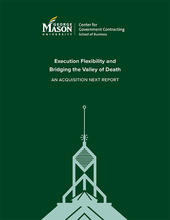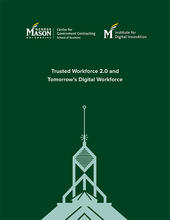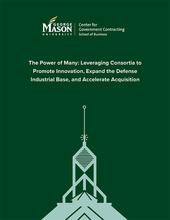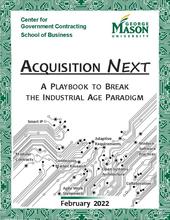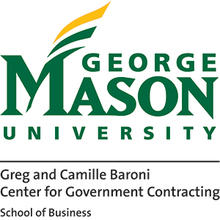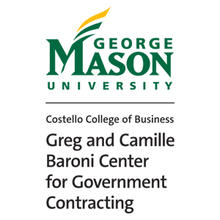Research
Center staff and affiliated faculty produce significant research ranging from commentary pieces in influential outlets, to white papers and essays on pressing government contracting issues, to peer-reviewed articles in premier journals.
Center competencies and capabilities are making an impact in the government contracting industry:
- Unique and influential analysis, commentaries, reports, and webinars on the federal response to COVID.
- White Paper Series that shares cutting edge research on small business transition, intellectual property, DoD budget reform, acquisition reform, and industrial base resilience.
- Impactful op eds in The Hill, Business Insider, Defense One, Defense News, the National Interest, with additional coverage by national print and broadcast outlets.
Reports
- June 26, 2023Developing an effective “Build Allied” approach will help the Department of Defense create surge capacity, with both speed and scale, and industrial resilience in support of the National Defense Strategy (NDS) objectives.
- April 28, 2023The Statement of Objectives (SOO), available in Appendix 1, defines the overall objective of this study: “Identify the obstacles for small businesses to obtain financing in the private sector as well as when doing business with the Department of Defense.” (DoD) This final report addresses this objective, following the structure of the SOO.
- April 28, 2023In support of the Office of Defense Pricing & Contracting’s Contract Financing/Cost and Pricing Study, George Mason University’s Center for Government Contracting examined government accounting system requirements and their impact on commercial company participation in defense contracts.
- April 28, 2023This project focused on three research questions, over the period 2000 through 2019: A. Did free cash flow (FCF) increase or decrease over time? For what was FCF being used, and did that change over time? Was there a relationship between FCF and independent research and development (IR&D)?
- January 26, 2023Report to the Laboratories and Personnel Office, Office of the Under Secretary of Defense for Research and Engineering, U.S. Department of Defense in response to the FY2020 NDAA requirement for "the Under Secretary of Defense for Research and Engineering to enter into an arrangement with a university business school or law school with resident economics and intellectual property expertise to conduct an independent assessment of the Defense Advanced Research Projects Agency’s and defense laboratories’ contracting and intellectual property management policies and their effects on the commercialization of and innovation in dual-use technology."
- October 26, 2022While the platform-based defense budgeting system works well for large capital investments, many other capital investments such as the Joint All-Domain Command and Control (JADC2) concept require modular, cross-cutting technologies that do not fit well into program stovepipes. Even when all stakeholders are aligned, there are precious few opportunities to get funding within the traditional resource allocation process. This creates a proverbial “valley of death” that frustrates everyone involved. What types of strategies can inject the execution flexibility necessary to bridge this valley of death and get capabilities in the hands of warfighters?
- August 2, 2022This report outlines the results of a workshop discussion on Trusted Workforce 2.0 (TW 2.0) implementation and academic initiatives to educate and train today and tomorrow’s cleared government contracting workforce.
- July 20, 2022The Center for Government Contracting releases a new report, “The Power of Many: Leveraging Consortia to Promote Innovation, Expand the Defense Industrial Base, and Accelerate Acquisition.”
- February 9, 2022To ensure overmatch against strategic adversaries like Russia and China, the defense acquisition system does not need a new set of reforms but rather a change in mindset. The Center for Government Contracting calls this change in mindset and approach "Acquisition Next." It seeks to replace industrial age paradigm of linearity and prediction with the modern approaches of modularity, speed, iteration, and competition. This playbook suggests a way to implement the Acquisition Next mindset.
- November 6, 2020Executive Director Jerry McGinn & Research Fellow Eric Lofgren compiled and analyzed data from the federal response to COVID-19.
- June 15, 2020Update and trends from the Center for Government Contracting on the COVID-19 response
- April 22, 2020Focuses on the performance of FAR and non-FAR authorities in the response to date.
White Paper Series
The Baroni Center for Government Contracting White Paper Series is a central focus of our work. The purpose of the series is to inject ideas into the government contracting ecosystem and identify potential solutions for vexing challenges facing the community.
In releasing these White Papers, the Center gratefully acknowledges the work of its senior fellows who wrote them. Through research, writing, and discussion, Center senior fellows champion matters of interest to the government contracting community. These fellows add a rich practitioner component for the Costello College of Business to better understand and support the GovCon industry.
We welcome your feedback and ideas for future topics in this series. Contact Charles Dolgas at cdolgas@gmu.edu.
- November 2, 2023Current government acquisition rules are depriving DoD from consistently getting the benefits of the best industry talent, the best commercial capabilities, and quicker transition and deployment of needed capabilities. If the regulatory burden and negative incentives are not addressed head on, no amount of outreach or training will bring businesses back into the defense marketplace—or keep them from leaving. . . . In this decisive decade, acquisition regulations and policy must be streamlined to deliver outcomes and informed by data gathered through continued analysis of the shrinking defense industrial base from multiple perspectives—and most importantly, through difficult conversations with industry partners.
- November 2, 2023This study sought to identify important trends in DoD’s supplier base and its rates of effective competition and market concentration, and importantly compare these trends with the rest of the federal government and its contractor base.
- August 23, 2023While the origins of the Small Business Administration’s (SBA) Small Disadvantaged Business (SDB) contracting program and its prime contracting goals date to 1958, the history of the program is one of ebbs and flows. While the SDB appellation has applied at both the prime and subcontracting level, this paper will concern itself with prime contracting opportunities. However, before examining the data on the SDB program, it is important to understand the origins and evolutions of the program, as they provide the context necessary to assess the current performance of the program.
- July 12, 2023The latest White Paper of the Greg and Camille Baroni Center for Government Contracting, “Back to the Future? Second Sourcing in Defense Acquisitions” argues: “Second sourcing in particular offers one strategy to counter the DoD’s unsightly dependence on single and sole sources of supply. Second Sourcing does not provide a panacea to all the supply chain issues faced by DoD, but an increase in the use of second sourcing methods could be used to pivot the U.S. defense industrial base away from the current status quo of peacetime efficiency and towards a new baseline of readiness to ensure overmatch against competitors like Russia and China.”
- December 15, 2022This paper looks at how Presidents have used their authority under the Federal Property and Administrative Services Act of 1949 (FPASA) to issue Executive Orders shaping the Federal acquisition system.
- December 5, 2022Examines the impact of M&A strategy on company value in the government contracting community. Our empirical findings show that investors react positively to customer expansion but not as favorable to customer penetration, as financial markets appear to prioritize access to new revenue sources over improving efficiencies.
- November 1, 2022This paper dives deeper into the history of how the legislative and executive branches managed defense budget portfolios in the 1960s and before, as well as how PPBE upended those traditional processes. The paper concludes that execution flexibility in the form of portfolio budgeting is not only consistent with economic efficiency, it is consistent with United States traditions of congressional control.
- October 7, 2022New market commercial space launch entrants are pursuing goals of affordable and repeatable access to space independent of the space agency. With this context, the paper asks if NASA has been a leader or a follower of the emergence of the modern space age.The paper asks if NASA has been a leader or a follower of the emergence of the modern space age.
- June 29, 2022June 29, 2022 — The Center for Government Contracting releases its latest White Paper: "Don't Get Ahead of the Data:" Artificial Intelligence and Predictive Maintenance in DoD.
- April 29, 2022The Department of Defense (DoD) faces unique data licensing challenges when acquiring artificial intelligence (AI) solutions from the private sector. This paper provides an alternative framework to the traditional data licensing strategies to better address the unique challenges of acquiring AI solutions.
- August 16, 2021This white paper explores U.S. Government and Department of Defense efforts to achieve defense exportability over the years, highlights current problems that deserve urgent attention, and suggests alternatives to improve performance.
- June 5, 2021This white paper outlines specific measures that the Department of Defense and Congress can undertake to help build U.S. industrial resilience through close cooperation with allies and partners.
Commentaries
Center commentaries provide timely insights into pressing government contracting issues in government and business. Whether the commentary topic is “in the news” or deserves “future attention,” readers are provided short, to the point on the topic, why the topic is important, and what to consider for its resolution.
- May 10, 2024Jeff Kojac, Baroni Center director of studies, presents how Congressional leadership is needed for Defense acquisition rapid innovation and adaptation.
- May 7, 2024The House Financial Services Committee’s hearing this week on the reauthorization of the Defense Production Act is timely and important. The DPA is an essential tool for national security that was little known prior to COVID-19. Its use during the pandemic helped the U.S. government mobilize its industrial base to allocate and distribute goods as well as make investments to build industrial capacity in critical areas such as ventilators and personal protective equipment during a time of national crisis. That recent experience, coupled with the daunting national security challenges facing us today, makes it a great time to strengthen the DPA for the future. Jerry McGinn's Opinion in Defense News shares how we can do it:
- April 8, 2024Secretary del Toro captures the essence of the anti-buyback argument, which has been articulated by Pentagon leaders for years: “You can’t be asking the American taxpayer to make even greater public investments while you continue, in some cases, to goose your stock prices through stock buybacks, deferring promised capital investments, and other accounting maneuvers.” Why do defense companies continue to pursue stock buybacks? It is principally the large mature defense primes such as Lockheed Martin, Northrop Grumman and HII that buy back stock. These firms are profitable, generate significant cash flow, have a relatively low cost of capital and are not highly leveraged.
- February 9, 2024Jerry McGinn's latest in NIDA's National Defense Magazine on competition in the defense industrial base presents and how to unlock new levels of competition for Defense.
- January 17, 2024Dr. Jerry McGinn, the director of the Baroni Center for Government Contracting at George Mason University, and Steve Grundman of the Atlantic Council and the Maxwell School of Citizenship and Public Affairs at Syracuse University — who both lead the Pentagon’s industrial policy office — discuss the Biden administration’s first ever National Defense Industrial Strategy that was unveiled by last week with Defense & Aerospace Report Editor Vago Muradian.
- January 16, 2024Tom Temin Federal Drive Podcast with Jerry McGinn on the first-ever National Defense Industrial Strategy.
- January 11, 2024Common Defense Network (ComDef) Interview with Dr. Jerry McGinn on Industrial base issues and international participation. DPA, NTIB and AUKUS also covered.
- January 3, 2024In an Op-Ed written by Jerry McGinn for Breaking Defense, McGinn argues that the Pentagon can move more quickly if it heeds lessons from a previous life-or-death acquisition story.
- October 27, 2023An Opinion by Jerry McGinn for The Hill.
- September 11, 2023In an Opinion written by Noah Rivers, Baroni Center Fellow, for C4ISRNET, new Cybersecurity Strategy authored by the Office of the National Cyber Director.
- September 4, 2023In a Reganism Podcast by Reagan Institute Policy Director Rachel Hoff, Jerry McGinn discuss the defense industrial base, working with allies on transnational industrial cooperation to alleviate global supply issues like those seen in Ukraine, and ongoing hurdles faced by America’s defense industry.
- July 18, 2023The need to strengthen supply chains is creating an opportunity for the revival of second sourcing, a method used until the 1990s to secure defense supply chains, write Olivia Letts and Jerry McGinn.
Affiliated Faculty
The Center for Government Contracting offers access to both the GovCon network and funds for research and writing, to enrich the understanding of the unique business interests on both sides of this market—government and business.
Affiliated Faculty appointments will
- Encourage academic research in GovCon;
- Advance the research reputation of the faculty and the Center;
- Offer grants and honoraria to support the effort faculty can bring to this discussion; and
- Offer a new avenue to engage faculty who share our interest to create a more efficient and effective market for the public good.
Current Appointments

Senior Associate Dean for Academic Affairs and Global Engagement
Additional Roles: Associate Professor, AccountingJK Aier is the senior associate dean for academic affairs and global engagement and an associate professor within the accounting area in the Costello College of Business at George Mason University.
Director, Center for Retail Transformation and Associate Professor, Information Systems and Operations Management
Additional Roles: Academic Director, Master's in Business AnalyticsMehmet Altug is an associate professor within the Information Systems and Operations Management Area in the Costello College of Business at George Mason University.
Area Chair, Accounting
Additional Roles: Associate Professor, AccountingLong Chen is an associate professor and accounting area chair in the Costello College of Business at George Mason University. She conducts empirical archival research on issues concerning financial reporting, auditing, corporate governance, and international accounting.
Assistant Area Chair, Information Systems and Operations Management
Additional Roles: Professor, Information Systems and Operations ManagementSidhartha Das is an assistant area chair and a professor within the Information Systems and Operations Management Area in the Costello College of Business at George Mason University.
Deputy Assistant to the Director for Strategic Initiatives at the Massachusetts Institute of Technology Lincoln Laboratory and Chairman and Co-Founder of the Andrew W. Marshall Foundation
Mr. Durnan is a director of Siga Technologies, LLC, and he has served as a director or trustee for MacAndrews & Forbes Worldwide Corp., Swift Prepaid Solutions, kSARIA Corp., Orthozon Technologies, Defensewerx, Antioch New England University, and Unity College.
Associate Professor, Management
Additional Roles: Masters of Science in Management Program DirectorVictoria Grady is the Masters of Science in Management program director and an associate professor within the Management Area in the Costello College of Business at George Mason University.
Assistant Professor of Finance, Ball State University
Reza Houston is an Assistant Professor of Finance at Ball State University. He has published articles in the Journal of Corporate Finance, Financial Review, Managerial Finance, and other journals. His research interests include political economy, mergers, and federal government contracting.
Founder & Executive Director, National Security Institute and Assistant Professor of Law & Director, National Security Law & Policy Program at the Antonin Scalia Law School at George Mason University
Jamil Jaffer currently serves as Founder and Executive Director of the National Security Institute and as an Assistant Professor of Law and Director of the National Security Law & Policy Program at the Antonin Scalia Law School at George Mason University, where he teaches classes on counterterrorism, intelligence, surveillance, cybersecurity, and other national security matters.
Associate Dean for Executive Education
Additional Roles: Associate Professor, MarketingBrett Josephson is the associate dean for Executive Education and an associate professor within the marketing area in the Costello College of Business at George Mason University.
Robert and Barbara Frick Professor of Business, Olin Business School, Washington University in St. Louis
Anne Marie Knott's research examines the optimal environment and policies (economic, industrial and firm) for innovation, and is best summarized in her book, How Innovation Really Works (March 2017). This interest stems from issues arising during an earlier career in defense electronics at Hughes Aircraft Company.


